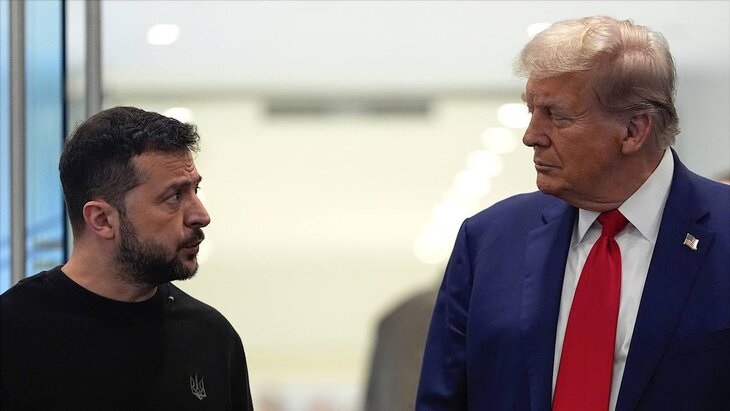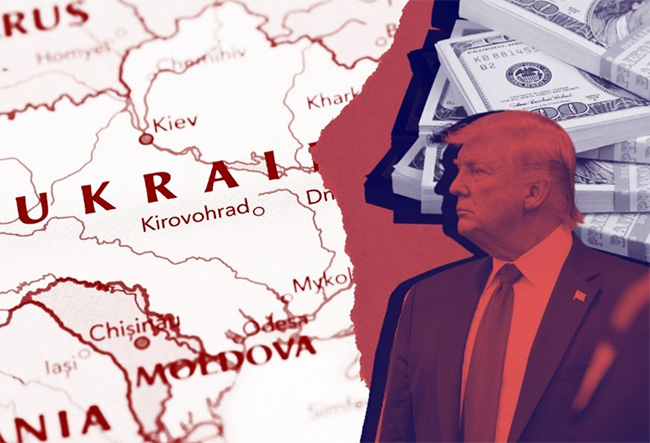 Trump and Zelensky.
Trump and Zelensky.
Photo: AP
Is U.S. President-elect Donald Trump the accomplished dealmaker he boasts to be, with the Russia-Ukraine war about to come to a peaceful end? We should take him on his word when he says he’s not keen on starting any new wars — but that’s not at all the same as crafting a settlement in an ongoing conflict, writes Carl Bildt, the co-chair of the European Council on Foreign Relations and a former prime minister of Sweden at ‘The Foreign Policy’. Trump clearly has no time for lengthy and complicated diplomatic processes.
Trump clearly has no time for lengthy and complicated diplomatic processes. In his view, real dealmakers don’t waste their time. He has no patience with details; it has to be quick. Even adjusting for what we have learned is Trumpian bluster, part of him was probably serious when he talked about “24 hours.”
Today, the Kremlin’s soldiers are advancing village by village…What could 24 hours of Trump-style peacemaking bring?
The assumption is that the Trump team will try to order the Kremlin and Ukraine to agree to a cease-fire, thereby freezing the conflict and hoping that it will go away. They will be in for a surprise when Russian President Vladimir Putin makes it clear, as he has consistently done since the start of the war, that he has no interest in any cease-fire that isn’t part of a Ukrainian capitulation to his main demands, including extensive limits to Ukraine’s security and sovereignty, as well as handing over even more of its territory to Russia.
What happens once it becomes clear to Trump and his team that Putin is not abandoning his goals in Ukraine? Acceptance of the fruits of aggression, no prospect of NATO membership, no military to speak of, an end to Western sanctions, and de facto Russian control of the politics and future of Ukraine?...
 Pic.: American Oversight
Pic.: American Oversight
President-elect Donald Trump is inheriting a war in Ukraine. He has pledged to put a swift end to the carnage, ‘The New York Times’ stresses.
Mr. Trump hasn’t explained his plan — if, indeed, he has one — but Vice President-elect JD Vance has called for Ukraine to cede captured land to Russia and drop its pleas to join NATO in exchange for peace. Mr. Trump’s national security adviser nominee, Representative Michael Waltz of Florida, has criticized the flow of U.S. aid to Ukraine and called for prompt negotiations, questioning whether the United States should support the complete liberation of Ukraine.
If Mr. Trump follows their advice and pushes Ukraine into talks that result in lost territory, his political rivals as well as hawks in his own party will accuse him of abandoning Ukraine.
Mr. Trump should do it anyway.
Dozens of people, and often hundreds, are dying every day in this grinding war. Mr. Trump should seize the chance to save lives. Nobody is coming to save Ukraine. A settlement will eventually be needed.
Despite flashes of spectacular success by Ukrainian forces, the Russian position has gradually strengthened, and there is no reason to expect Mr. Putin to lose the upper hand now. That may sound like defeatism, but it’s also realism. Nor is it a partisan perception — there have long been reports of Biden administration officials quietly trying to nudge Ukraine toward negotiations.
Getting Ukraine and Russia to the table would be only the beginning of an arduous negotiation. Decisions about how much conquered Ukrainian land remains under Russian control are fraught, but that won’t even be the hardest part — after all, either country’s leader can frame those as temporary losses or gains to be reversed later through diplomacy or even force.
The truly intractable problem is Mr. Zelensky’s demand that the West protect Ukraine from future Russian attacks by providing what diplomats euphemistically call “security guarantees.” In practice, Ukraine wants its military rebuilt and strengthened (that part will be easy to get) and also, crucially and controversially, an immediate invitation to join NATO.
On that point alone, talks could collapse. Mr. Putin has demanded, as a condition of peace, that Ukraine commit to remaining nonaligned (in other words, no NATO or security treaties) and nonnuclear (Ukraine is capable of developing nuclear weapons, and this could be a plausible, if extreme, backup plan if the West can’t provide protection). Mr. Vance, too, has suggested that Ukraine should commit to neutrality and give up its NATO ambitions. Even President Biden — who purports to be Ukraine’s greatest defender — has said that he wouldn’t support the “NATOization of Ukraine.”
The United States, meanwhile, staked out an awkward middle ground — supporting the war enough to keep it going, but never enough to win.
Whatever you think of NATO (another topic for another day), there is no question that the West, by talking from both sides of its mouth, left Ukraine in an untenable geopolitical limbo. The country didn’t get the protections of NATO — just the consequences of Mr. Putin lashing out over the possibility of Ukraine joining NATO. Nearly two decades later, Ukraine remains where it has long lingered: always on the verge of being taken into the alliance but never quite there.
It is this uneasy dynamic — a Ukraine close to the West, striving for inclusion in the West, but not truly part of it — that has defined the U.S. management of this disastrous war. We want Ukraine to function as a protectorate, but ultimately, we are unwilling to protect it.
America is not going to save Ukraine. Maybe we need Mr. Trump to finally say so outloud and act accordingly.
read more in our Telegram-channel https://t.me/The_International_Affairs

 11:20 20.11.2024 •
11:20 20.11.2024 •






















